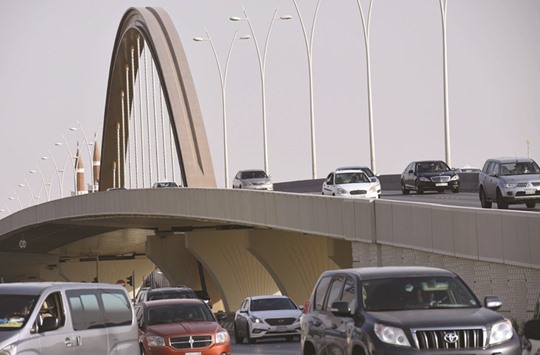Gulf countries are gearing up for a prolonged period of low oil prices and pushing through reforms that are more ambitious than the last time crude slumped in the 1980s, according to investment bank Renaissance Capital.
“We think the Gulf is acting in a much more vigorous and far reaching way than was the case the last time oil prices collapsed,” Renaissance analysts Charles Robertson and Vikram Lopez wrote in a report published yesterday. “A key question is whether reform is more credible now than it was in the 1980s? The answer, we think, is yes.”
The six countries that make up the Gulf Cooperation Council face a combined budget deficit of 12.3% of economic output this year, according to International Monetary Fund projections, and have introduced cost-saving programs that include lowering or removing subsidies and plans for value added taxation. Saudi Arabia’s break-even oil price has fallen to $67 this year from $106 in 2014, the IMF estimates.
There’s a significant difference with the reforms of the 1980s, which were “modest and late” and left Gulf economies still too dependent on state spending and with rigid labour markets, according to Renaissance Capital. Subsidies in Saudi Arabia surged to 68% of oil revenue in 1984 from 4% in 1975, the report said.
“Some reform did happen then but from a poor base – when human capital was under-developed, governments believed they should maintain a strong role in the economy and basic economic principles were ignored for political reasons,” Renaissance said in the report.
Some economists, however, are sceptical of the reform drive and argue that private sector businesses won’t be strong enough to pick up the slack from falling oil revenues. The IMF predicts non-oil real GDP growth to fall to 2.5% this year, from 6.3% as recently as 2013.
“We would caution against getting carried away,” Capital Economics said of Saudi Arabia’s plan in an e-mailed research note yesterday. “The authorities have made considerable progress in tightening fiscal policy, but there is little sign of a clear path for weaning the economy off oil, let alone tackling the vested interests that may scupper reform.”
Separately, Saudi Arabia and Jordan agreed to set up a joint coordination council that will oversee investments by the Saudi Public Investment Fund.
The fund’s investments will be the largest in Jordan in decades and “will unblock billions of dollars” for the Hashemite kingdom, Bassem Awadallah, King Abdullah II’s special envoy to Saudi Arabia, said by phone from Amman. Agreements on nuclear power cooperation and on uranium extraction are also expected to follow, he said.
“We’ve never had an Arab investment fund that has come to commit billions of dollars in investments in leading sectors of the economy in Jordan,” Awadallah said. The new council will determine which sectors will be chosen and how much will be invested, and the two countries will also cooperate in Jordan’s Aqaba special economic zone, Awadallah said.
Saudi Arabia’s recent drive to expand regional investments is also part of its plan to reduce its reliance on oil. The Jordan agreement follows a deal between Egypt and Saudi Arabia to build a bridge connecting the two nations, part of an agreed $25bn of Saudi investment that includes the development of an industrial area near the Suez Canal.
The bridge between Egypt and Saudi Arabia will boost trade and help to link major business hubs in the region, including Jordan and other countries, Saudi Deputy Crown Prince Mohammed bin Salman said in an interview with Al Arabia television this week.

A picture taken on April 26 shows a cable bridge that was newly built in the Saudi capital Riyadh. Gulf countries are gearing up for a prolonged period of low oil prices and pushing through reforms that are more ambitious than the last time crude slumped in the 1980s, according to investment bank Renaissance Capital.
